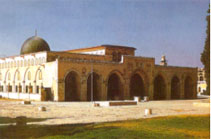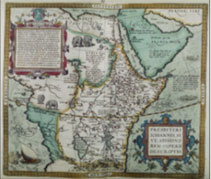The Life of Prophet Muhammad PART II In Al-Madinah | ||||
The Jews and Hypocrites
In the first year of his reign at Yathrib the Prophet made a solemn treaty with the Jewish tribes, which secured to them equal rights of citizenship and full religious liberty in return for their support of the new state. But their idea of a Prophet was one who would give them dominion, not one who made the Jews who followed him brothers of every Arab who might happen to believe as they did. When they found that they could not use the Prophet for their own ends, they tried to shake his faith in his Mission and to seduce his followers, behavior in which they were encouraged secretly by some professing Muslims who considered they had reason to resent the Prophet’s coming, since it robbed them of their local influence. In the Madinah’s surahs there is frequent mention of these Jews and Hypocrites. The Qiblah Till then the Qiblah (the place toward which the Muslims turn their face in prayer) had been Jerusalem . The Jews imagined that the choice implied a leaning toward Judaism and that the Prophet stood in need of their instruction. He received command to change the Qiblah from Jerusalem to the Ka‘bah at Makkah. The whole first part of juz’ 2, part of Surah II, relates to this Jewish controversy. The First Expeditions The Prophet’s first concern as ruler was to establish public worship and lay down the constitution of the State: but he did not forget that Quraysh had sworn to make an end of his religion, nor that he had received command to fight against them till they ceased from persecution. After he had been twelve months in Yathrib several small expeditions went out, led either by the Prophet himself or some other of the fugitives from Makkah for the purpose of reconnoitering and of dissuading other tribes from siding with Quraysh. These are generally represented as warlike but, considering their weakness and the fact that they did not result in fighting; they can hardly have been that, though it is certain that they went out ready to resist attack. It is noteworthy that in those expeditions only fugitives from Makkah were employed, never natives of Yathrib; the reason being (if we accept Ibn Khaldun’s theory, and there is no other explanation) that the command to wage war had been revealed to the Prophet at Makkah after the Yathrib men had sworn their oath of allegiance at al-‘Aqabah, and in their absence. Their oath foresaw fighting in mere defense not fighting in the field. Blood was shed and booty taken in only one of those early expeditions, and then it was against the Prophet’s orders. One purpose of those expeditions may have been to accustom the Makkah Muslims to going out in war like trim. For thirteen years they had been strict pacifists, and it is clear, from several passages of the Qur’an, that many of them, including, it may be, the Prophet himself, hated the idea of fighting even in self-defense and had to be inured to it. |
Sunday, March 15, 2009
The Life of Prophet Muhammad(part 2)
The Hijrah ( June 20th, 622 C.E.)
The last of the able Muslims to remain in Makkah were Abu Bakr, Ali and the Prophet himself. Abu Bakr, a man of wealth, had bought two riding camels and retained a guide in readiness for the flight. The Prophet only waited for God’s command. It came at last. It was the night appointed for his murder. The slayers were before his house. He gave his cloak to Ali, bidding him lie down on the bed so that anyone looking in might think Muhammad lay there. The slayers were to strike him as he came out of the house, whether in the night or early morning. He knew they would not injure Ali. Then he left the house and, it is said, blindness fell upon the would-be murderers so that he put dust on their heads as he passed by-without their knowing it.
The Hijrah counts as the beginning of the Muslim era |
He went to Abu Bakr’s house and called to him, and they two went together to a cavern in the desert hill and hid there till the hue and cry was past, Abu Bakr’s son and daughter and his herdsman bringing them food and tidings after nightfall. Once a search party came quite near them in their hiding-place, and Abu Bakr was afraid; but the Prophet said: “Fear not! Allah is with us.” Then, when the coast was clear, Abu Bakr had the riding-camels and the guide brought to the cave one night, and they set out on the long ride to Yathrib.
After traveling for many days of unfrequented paths, the fugitives reached a suburb of Yathrib, whither, for weeks past, the people of the city had been going every morning, watching for the Prophet till the heat drove them to shelter. The travelers arrived in the heat of the day, after the watchers had retired. It was a Jew who called out to the Muslims in derisive tones that he whom they expected had at last arrived.
Such was the Hijrah, the Flight from Makkah to Yathrib, which counts as the beginning of the Muslim era. The thirteen years of humiliation, of persecution, of seeming failure, of prophecy still unfulfilled, were over.
Plot to Murder the Prophet
Soon the Muslims who were in a position to do so, began to sell their property and to leave Makkah unobtrusively. Quraysh had wind of what was going on. They hated Muhammad in their midst, but dreaded what he might become if he escaped from them. It would be better, they considered, to destroy him now. The death of Abu Talib had removed his chief protector; but still they had to reckon with the vengeance of his clan upon the clan of the murderer. They cast lot and chose a slayer out of every clan. All these were to attack the Prophet simultaneously and strike together, as one man. Thus his murder would be blamed on all Quraysh. It was at this time (Ibn Khaldun asserts, and it is the only satisfactory explanation of what happened afterwards) that the Prophet received the first revelation ordering him to make war upon his persecutors “until persecution is no more and religion is for Allah only.”
First Pact of al-‘Aqabah
| Quraysh dreaded what the Prophet might become if he escaped from them and so plotted to kill him |
First Pact of al-‘Aqabah
These swore allegiance to him in the first pact of al-‘Aqabah. They then returned to Yathrib with a Muslim teacher in their, company and soon “there was not a house in Yathrib wherein there was not mention of the messenger of Allah.”
Second pact of al-‘Aqabah
In the following year, at the time of pilgrimage, seventy-three Muslims from Yathrib came to Makkah to vow allegiance to the Prophet and invite him to their city. At al-‘Aqabah, by night, they swore to defend him as they would defend their own wives and children. It was then that the Hijrah, the flight to Yathrib, was decided.
The Men from Yathrib
They came from Yathrib, a city more than two hundred miles away, which has since become world-famous as al-Madinah, “the City” par excellence. At Yathrib there were Jewish tribes with learned rabbis, who had often spoken to the pagans of a Prophet soon to come among the Arabs, with whom, when he came, the Jews would destroy the pagans as the tribes of ‘Aad and Thamud had been destroyed of old for their idolatry. When the men from Yathrib saw Muhammad they recognized him as the Prophet whom the Jewish rabbis had described to them. On their return to Yathrib they told what they had seen and heard, with the result that the next season of pilgrimage a deputation came from Yathrib purposely to meet the Prophet.
Destruction of the Document
At length some kinder hearts among Quraysh grew weary of the boycott of old friends and neighbors. They managed to have the document which had been placed in the Ka`bah brought out for reconsideration; when it was found that all the writing had been destroyed by white ants, except the words Bismik Allahumma (“In thy name, O Allah”). When the elders saw that marvel the ban was removed, and the Prophet was again free to go about the city. But meanwhile the opposition to his preaching had grown rigid. He had little success among the Makkans, and an attempt which he made to preach in the city of Ta’if was a failure. His mission was a failure, judged by worldly standards, when, at the season of the yearly pilgrimage he came upon a little group of men who heard him gladly.
The Flight to Abyssinia
|
| A 16th century map of Abyssinia – modern day Ethiopia |
The converts of the first four years were mostly humble folk unable to defend themselves against oppression. So cruel was the persecution they endured that the Prophet advised all who could possibly contrive to do so to immigrate to a Christian country, Abyssinia . And still in spite of persecution and emigration the little company of Muslims grew in number. Quraysh were seriously alarmed. The idol worship at the Ka`bah, the holy place to which all Arabia made pilgrimage, ranked for them, as guardians of the Ka`bah, as first among their vested interests. At the season of the pilgrimage they posted men on all the roads to warn the tribes against the “madman” who was preaching in their midst. They tried to bring the Prophet to a compromise offering to accept his religion if he would so modify it as to make room for their gods as intercessors with Allah, offering to make him their king if he would give up attacking idolatry; and, when their efforts at negotiation failed, they went to his uncle Abu Talib offering to give him the best of their young men in place of Muhammad, to give him all that he desired, if only he would let them kill Muhammad and have done with him. Abu Talib refused.


